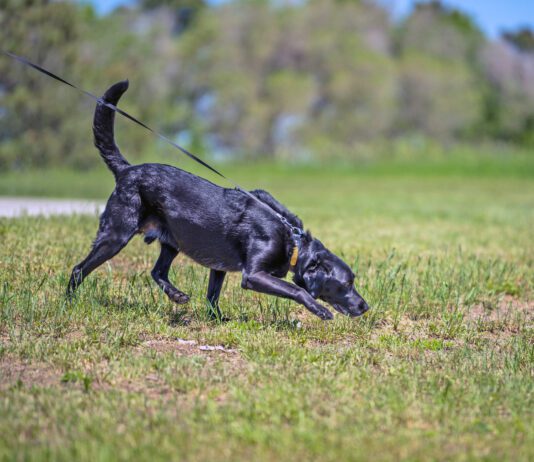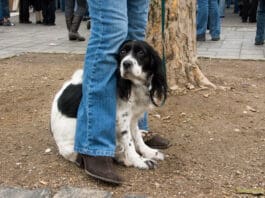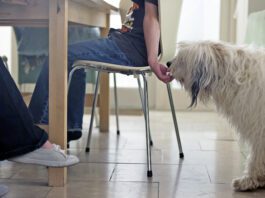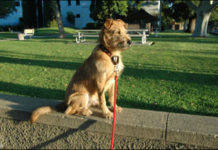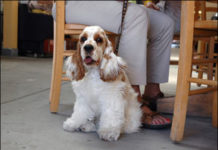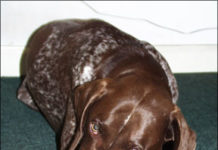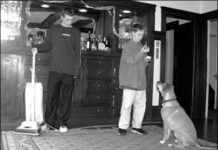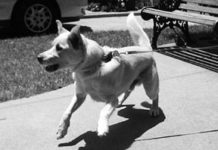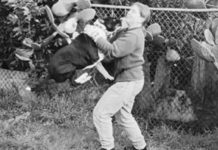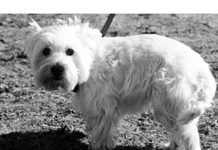Getting to Know Your Dog
It's going to be really difficult to stay caught up with everything we've been going through with our new dog, Otto. Every day brings...
Uncommonly Calm Canines
Most dog owners are pleased when their dogs are calm - even the owners of high-energy competition and working dogs, when those dogs are "off-duty." Some owners may go to great - sometimes misguided - lengths to achieve the coveted calm condition. Humans who understand the appropriate way to help a dog learn to be calm can make the difference between the canine companion who finds a lifelong loving home, and the one who ends up - sometimes several times in his life - gazing sadly out from the chain-link kennels of an animal shelter. Calm is a highly valued, hard-won, and sometimes transitory state in our own household. With four dogs in the Miller pack, two of them proud representatives of the herding group, calm is something we have to work at. We use the time-honored recipe of exercise, management, and training (and of course, lots of love) to help our canine family members be a peaceable pack.
Dogs and Puppies Chew For a Number of Reasons, Learn to Properly Channel This...
between three and six months of age. While the baby teeth are shedding and the adult teeth are erupting
Reducing Your Dog’s Anxieties
President Franklin D. Roosevelt, speaking about the Great Depression, said, We have nothing to fear but fear itself." If only it were that simple when dealing with dog behavior! Fear-related behaviors can be debilitating to the inappropriately fearful dog. They are heartbreaking
Does Your Dog Have an Eating Disorder?
Anorexia, bulimia, and weird pregnancy cravings are common in humans, but did you know dogs have eating disorders, too?
Involuntary Urination
When my dog Popcorn woke up one morning many years ago in a puddle of urine, I panicked, certain that only a deadly illness could cause this perfectly housetrained dog to wet her bed. I rushed her to the vet, where he did a thorough physical exam and urinalysis. I can still remember the relief I felt when my vet told me it appeared to be a simple case of incontinence. As it turns out, incontinence, which is defined as involuntary urination, is quite common in dogs, especially spayed females, where about one in five dogs (20 percent) is affected.
Signs That Your Dog Has Stress
Learn to recognize signs of (and then reduce) your dog's stress. If possible, remove the stressor from your dog's environment entirely. For example, if he's stressed by harsh verbal corrections, shock collars, and NASCAR races on TV, you can probably simply stop exposing him to them. For stressors that can't be eliminated, a long-term program of counter-conditioning and desensitization can change the dog's association with a stressor from negative to positive, removing one more trigger for stress signals and possible aggression.
Help for the Home-Alone Dog
As soon as the kids went back to school and Carly was left home alone during the day, things in and around the Hoye’s house began to get chewed. Initially, they thought it was just puppy teething, and to save the rugs and furniture (not to mention the hardwood floors and woodwork around the doors and windows in their restored Victorian) the Hoyes started leaving Carly outside during the day. But she soon advanced to chewing the lattice off the sides of the deck and the shingles off the sides of the house.
Your Dog’s Pet Peeves
Eavesdrop on a group of dog owners discussing their dogs, and along with a lot of brags about newly trained behaviors and hard-won trophies and titles, you’re likely to hear a fair number of complaints about the annoying things their canine companions do. Well guess what? If you could eavesdrop on a pack of dogs at the dog park, you might well hear a litany of things that humans do to annoy their dogs!
When Your Dog Hates Being Touched
not training. Proceed more slowly
Causes of Reactive Dog Behavior and How to Train A Reactive Dog
“Reactive” is a term gaining popularity in dog training circles – but what is it, exactly? In her book Clinical Behavioral Medicine for Small Animals, Applied Animal Behaviorist Karen Overall, M.A., V.M.D., Ph.D., uses the term to describe animals who respond to normal stimuli with an abnormal (higher-than-normal) level of intensity. Take a deep breath and relax. We have positive training solutions for dogs who "go off" or "lose it" in certain circumstances.
Calmative Herbs for Canine Panic Attack Occurrences
Dark clouds boil on the horizon, and a slow rumble of distant thunder delivers a slight vibration in the window panes. Jake, a large long-haired Chow-mix, is already nervous. He paces the living room, wild-eyed and panting, his body trembling with anticipation of the first dreaded clap of thunder. When it strikes, he tries to hide under the coffee table, and just like last time, he is too big to fit. The very same vase that was glued together after Fourth of July is reduced to a heap of jagged shards.


